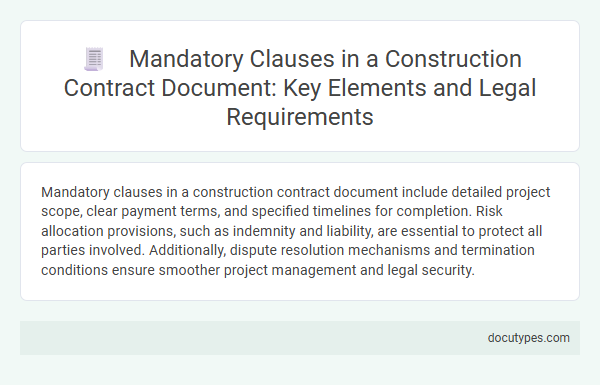Mandatory clauses in a construction contract document include detailed project scope, clear payment terms, and specified timelines for completion. Risk allocation provisions, such as indemnity and liability, are essential to protect all parties involved. Additionally, dispute resolution mechanisms and termination conditions ensure smoother project management and legal security.
Introduction to Mandatory Clauses in Construction Contracts
Construction contracts require specific mandatory clauses to ensure clarity and legal enforceability. These clauses define obligations, rights, and remedies for all parties involved in the project.
Mandatory clauses typically include scope of work, payment terms, timelines, and dispute resolution methods. You must understand these elements to protect your interests and avoid potential conflicts. Properly drafted contracts establish a clear framework for project execution and completion.
Importance of Including Mandatory Clauses
Including mandatory clauses in a construction contract document ensures clarity and legal protection for all parties involved. These clauses define roles, responsibilities, timelines, and payment terms, minimizing disputes during project execution.
Your contract must incorporate mandatory provisions such as scope of work, payment schedule, dispute resolution, and termination conditions. These essential clauses safeguard your interests and facilitate smooth project management from start to finish.
Scope of Work and Specifications
The Scope of Work and Specifications are fundamental mandatory clauses in a construction contract document. These clauses define the project's detailed requirements and responsibilities to ensure clarity and prevent disputes.
- Scope of Work - This clause outlines the specific tasks, deliverables, and timelines that the contractor must follow during the project.
- Specifications - This section describes the technical standards, materials, and workmanship quality required for the construction work.
- Project Boundaries - It sets clear limits on the extent of work to avoid scope creep and ensure both parties understand the contract's range.
Payment Terms and Schedule
Payment terms and schedule are critical mandatory clauses in a construction contract document to ensure clarity and avoid disputes. These clauses outline the timing, method, and conditions of payments between the contracting parties.
- Payment Amounts - Specifies the exact sums to be paid for milestones, materials, labor, and completed work phases.
- Payment Schedule - Defines deadlines for progress payments, final payments, and any retainage withheld until project completion.
- Conditions for Payment - Details requirements such as submission of invoices, approval of work, and compliance with contract terms before payments are processed.
Clearly defined payment terms and schedule clauses protect both contractors and clients by ensuring transparent financial transactions throughout the construction project.
Performance Bonds and Security Requirements
| Clause | Description |
|---|---|
| Performance Bonds | Guarantee contractor's fulfillment of contractual obligations. Provides financial protection to the project owner if the contractor fails to complete the work according to contract terms. Typically issued by a reputable surety company and stipulates bond amount, conditions for bond claim, and duration of coverage. |
| Security Requirements | Specify types and amounts of financial securities contractors must provide. Include performance bonds, payment bonds, and retention money. Ensure contractor's commitment and protect owner against non-performance or delayed completion. Security requirements reduce project risk and establish accountability. |
Change Order Procedures
Change order procedures are mandatory clauses in a construction contract document that outline the process for modifying the original scope of work. These clauses specify how change requests must be submitted, reviewed, and approved to ensure clarity and avoid disputes. Including detailed change order procedures helps maintain project timelines, budgets, and legal compliance throughout construction.
Timeframes and Completion Deadlines
What are the mandatory clauses related to timeframes and completion deadlines in a construction contract document? Construction contracts must specify clear project start and end dates to ensure accountability. Defining milestone deadlines and penalties for delays protects both parties and promotes timely project completion.
Dispute Resolution and Arbitration
Understanding the mandatory clauses in a construction contract is essential for protecting your interests. Dispute resolution and arbitration clauses play a critical role in managing conflicts effectively.
- Dispute Resolution Clause - Specifies the process parties must follow to resolve disagreements without litigation.
- Arbitration Clause - Defines arbitration as a mandatory method for settling disputes outside of court, ensuring faster and confidential resolution.
- Governing Law Clause - Identifies the legal jurisdiction applicable to the contract and arbitration proceedings.
Termination Clauses and Exit Rights
Mandatory clauses in a construction contract document ensure clarity and protect all parties involved. Termination clauses specify the conditions under which the contract can be lawfully ended, addressing issues such as breach, force majeure, or mutual agreement. Exit rights outline the procedures for contract disengagement, including notice requirements, compensation, and protection against liabilities.
What Are the Mandatory Clauses in a Construction Contract Document? Infographic

